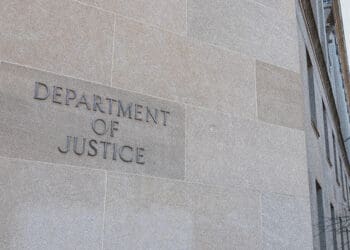Key Steps in the Early Stage of a Federal Investigation
Although many were unsure how white collar crime enforcement would fare in the Trump administration, the past two years has shown that enforcement actions have nearly stayed the course, with a strong focus on FCPA-related matters. In this article, Brooklyn Sawyers Belk, an attorney at law firm Weinberg Wheeler Hudgins Gunn & Dial, discusses how companies should respond upon receipt of a target letter from federal investigators.
Surprise and happy holidays! Your corporation is the target of a federal investigation led by an alphabet soup agency – SEC OIG (Securities and Exchange Commission Office of Inspector General), for example, or the SS (Secret Service) or FBI (Federal Bureau of Investigation), who are euphemistically part of the agencies known as the Alphabet Boys.
Now, how do you respond?
LISTEN. THINK. WIN.
LISTEN!
Understand
As shown here in the Department of Justice (DOJ) example, a target letter is notice that a corporation is under investigation for suspected violations of federal law. More aptly, the investigation is probably largely concluded upon your receipt of the notice invoking thoughts of a gift, wrapped and tied with a bow, on a prosecutor’s desk, having been delivered by a gleeful federal agent.
The letter is issued by a DOJ prosecution entity like a litigating division at Main Justice or any of the 94 United States Attorney’s Offices, all of whom have the Attorney General’s delegated authority to indict and prosecute targets. The letter provides the general nature of the charges, often by citation to specific United States Code sections indicating the federal law that prosecutors believe the corporation broke, inadvertently or otherwise. The letter explains further that the addressee is a target with exposure for being prosecuted for violations of federal law, as opposed to a witness or subject, and believed to have information helpful to an investigation, but not considered culpable for the actual offense.
The letter explains the target’s constitutional rights against self-incrimination and to representation by counsel under the United States Constitution’s Fifth and Sixth Amendments. The letter provides a specific response time and identifies the prosecutor, and sometimes the federal agency, investigating the alleged offenses.
Because the investigation is largely concluded before the target letter is signed, sealed and delivered, the prosecutor could have taken the collected evidence and appeared before a grand jury to seek an indictment. Instead, the prosecutor issued the target letter, which implies the prosecutor’s desire to resolve the matter without a formal indictment. If the target responds, the prosecutor is likely to give the target an opportunity to resolve the matter with an information and indictment waiver in lieu of grand jury presentment.
The difference between the indictment and information are subtle by definition, but significant in application. Under the Fifth Amendment, an indictment is a formal charge presented to a grand jury, who determines whether probable cause exists (that is, it’s more likely than not that the corporation named in the indictment did what the United States claims). An information does the same thing, except it is issued by the prosecuting attorney without a grand jury presentment, the lack of which requires that the information be accompanied by the defendant’s (note the change in the corporation’s posture from mere target to defendant because, with the filing of these two documents, the corporation sheds its target status for that of defendant) written waiver of its Constitutional indictment right. They look similar and the words even sound alike. The significant difference is the opportunity for the target, who is “targeted” to become a defendant, to negotiate the charge and reach a mutually agreeable resolution (“investigation, investigation go away, do not come again another day” is unlikely to be a viable resolution, but it never hurts to ask, so start there). The latter, information-driven process, saves the prosecutor resources – time and money, savings that are often passed on to the defendant. Both time (day-for-day prison time for culpable corporate principals and years of discovery, motions’ practice, trials and appeals) and money (litigation costs and lost corporate productivity) are coveted commodities in the criminal system. Thus, while the target letter receipt is undesirable, it is a corporate opportunity to get out in front of an indictment and for a proactive joint resolution, which is more desirable than the dreaded reactive posture.
Consult.
The advice of others can often be taken with a grain of salt, but in this circumstance, the right to counsel mentioned in the target letter is just wise. Do not respond without consulting outside counsel, such as someone with extensive DOJ experience, who is likely to recommend following the target letter’s second admonition – remain silent to avoid self-incrimination. The prosecution team will have lived with the investigation for a significant time, having examined evidence and interviewed witnesses. A cold call from a target to any member of the team could lead to the unwitting disclosure of incriminating evidence. Plus, when under the pressure of looming federal criminal charges, coupled with internal corporate finger-pointing that will follow, the corporate representative could easily sidestep her own corporate fiduciary obligations, resulting in significant personal liability. Just DON’T!
THINK!
Respond.
Burying one’s head in the sand or the target letter under a pile of paperwork is not the way to go. The target letter comes with specific response instructions, including a response deadline. Should the target miss the response deadline, events that are undesirable for the recipient will ensue, such as a grand jury determination that probable cause exists to indict the target (a grand jury will indict a ham sandwich if a prosecutor asks it to – in a closed, secret ex-parte proceeding that the corporation will not even know happened). Therefore, consult counsel upon receipt of the target letter so that a timely response follows.
Preserve.
Destruction of evidence is a federal criminal offense that carries fines and imprisonment as possible punishments. To avoid any allegation of such, issue a preservation letter to the relevant corporate employees and agents directing them to preserve all information, including electronic data like emails, related to the investigation topic. It can be difficult to craft a well-defined, sufficiently narrow preservation request based on the terse information contained in the target letter. Do it anyway. Effort matters here, especially later before a federal judge, who will evaluate a claim of the corporation’s wrongdoing regarding evidence destruction.
Decide.
An adequate target letter response requires role assignment. Who are the corporate principals, agents and spokespersons? This may be a simplistic question at first glance, but when federal criminal charges are looming, lines are quickly blurred. Circle the wagons and determine who has the authority to bind the corporation. Then, review what evidence the prosecutors likely have. This will be a guessing game, as the target letter will only mention the federal laws broken. Therefore, the corporate principals will have to ask and answer difficult questions to determine what corporate or individual actions allegedly sidestepped the law. Share that information with outside counsel. Remember also that a target’s change in story when speaking to federal authorities can be characterized as false statements under 18 U.S.C. § 1001. So, determine the corporate “truth” before speaking outside the corporation.
Strategize.
While receipt of a target letter is not at the top of any corporation’s wish list, there is hope, because it could always be worse. What is worse than a target letter? A federal grand jury indictment, which means potentially costly, prolonged litigation. Until an indictment is returned, the corporation is in an excellent position to unite in defense of the corporation’s common interest and strategize on the best way to limit exposure, both criminally and socially, as negative publicity can destroy a corporation as fast as costly litigation.
Meet with experienced outside counsel – again, preferably someone with extensive DOJ experience, and consider consulting PR counsel regarding crisis communication. Then, determine the best strategy, both inside the corporation with employees and outside the corporation with shareholders, clients and investigators. In other words, determine the corporate story, who will best tell that story and how the corporation can present that story to make the best of the undesirable situation.
WIN
Conclude.
Will the corporation cooperate with the prosecutor or not? That is the question. There are positives and negatives to both approaches. Determining which approach is right for your corporation requires an in-depth analysis based on a fact-specific inquiry that only experienced criminal defense attorneys are equipped to do. Concluding this process with the right counsel determines whether the corporation wins or loses.
Consult an attorney as early as possible, preferably upon receipt of a target letter – or even before, if you are concerned your corporation is or may become a federal target.



 Brooklyn Sawyers Belk serves as Partner and Chief Diversity and Inclusion Officer at Weinberg Wheeler Hudgins Gunn and Dial. She previously served as an Assistant United States Attorney in three U.S. Attorney’s Offices and a Trial Attorney for the Department of Justice.
Brooklyn Sawyers Belk serves as Partner and Chief Diversity and Inclusion Officer at Weinberg Wheeler Hudgins Gunn and Dial. She previously served as an Assistant United States Attorney in three U.S. Attorney’s Offices and a Trial Attorney for the Department of Justice. 









